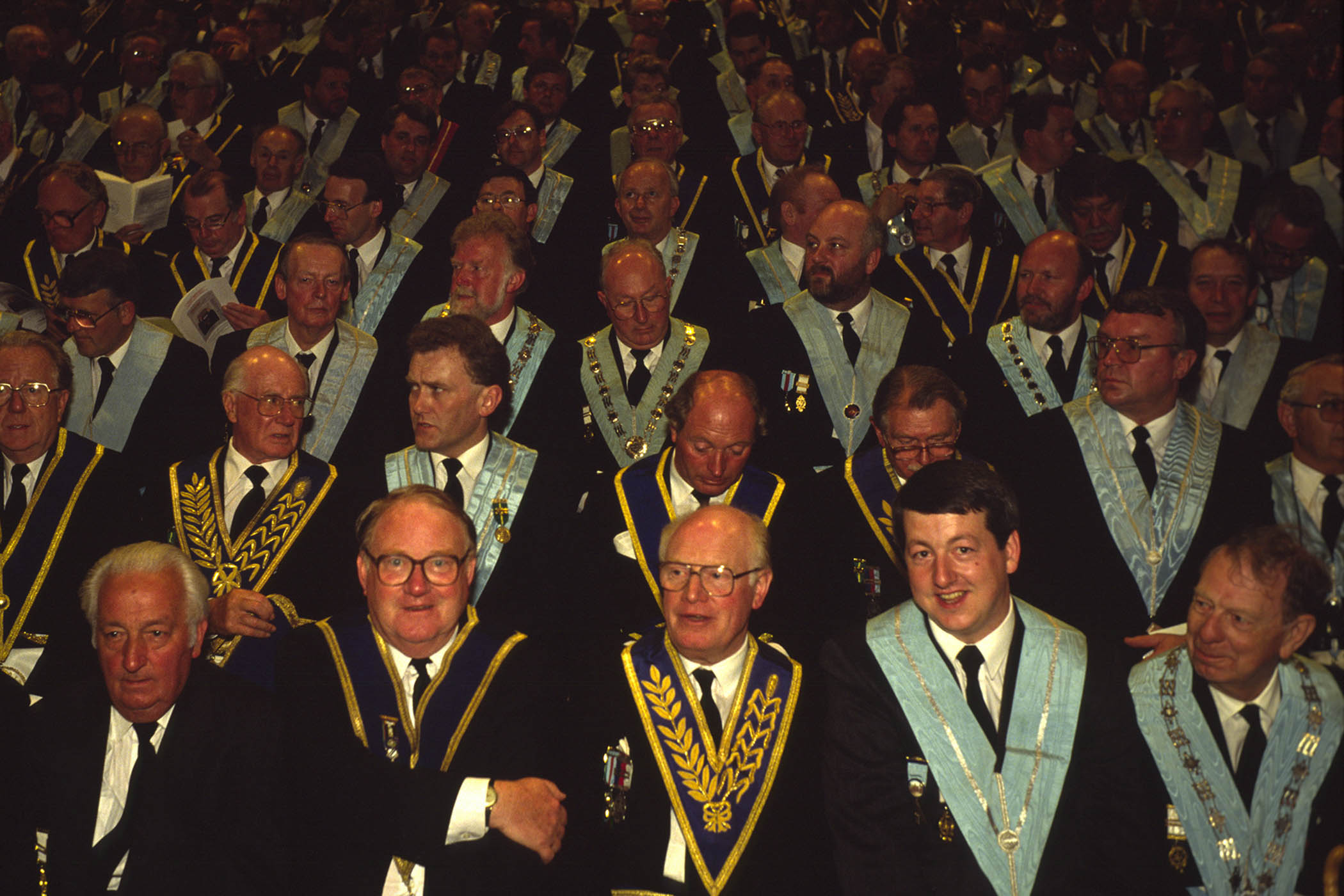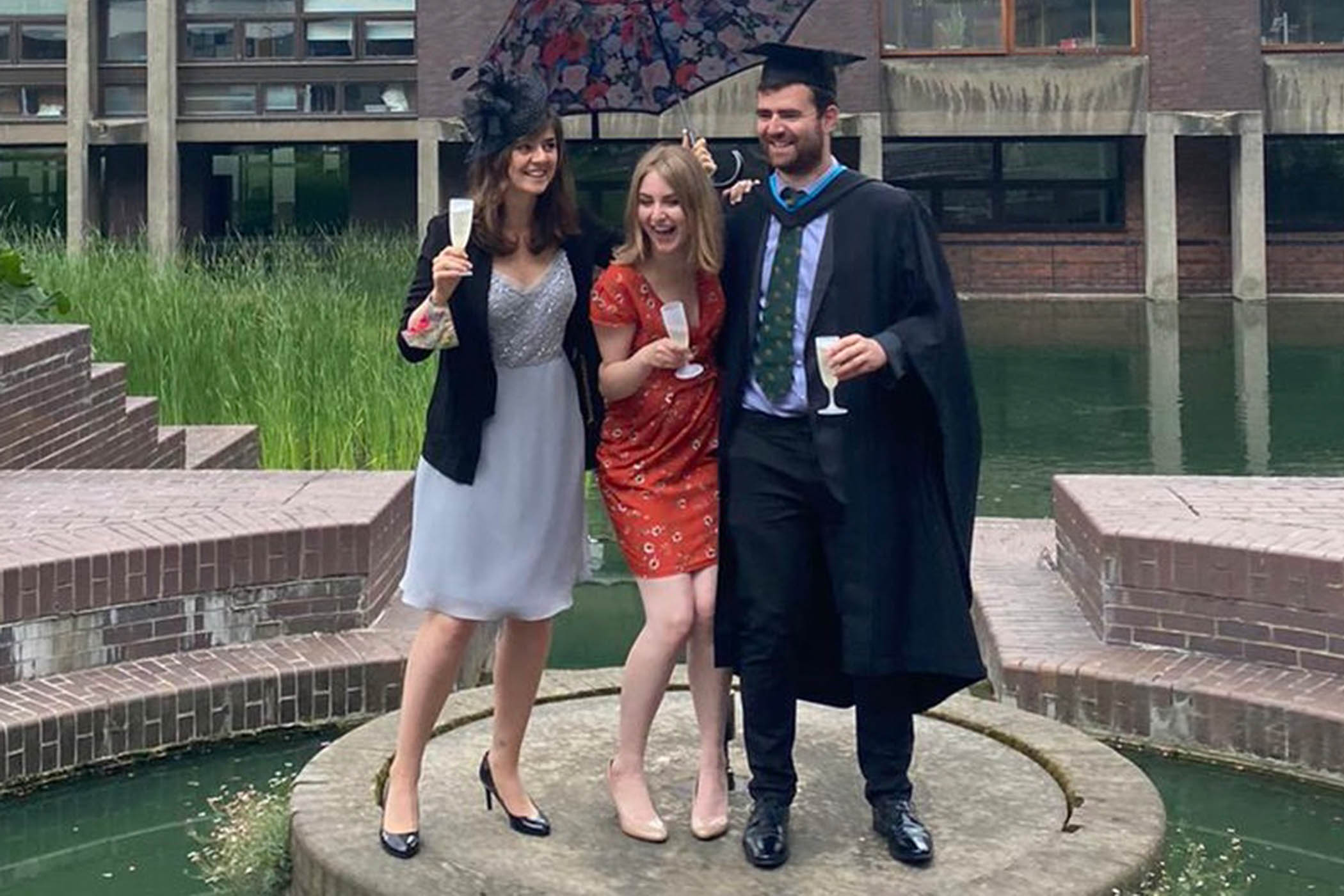It was not until 1987 that “beheading and ripping out the tongue” were officially struck from the books of Britain’s freemasons as punishments for revealing their secrets. “It has upset some people who got squeamish about it,” a masonic source said at the time. “The obligations will remain, but not the penalties.”
Now this modern PR campaign is going further still. For centuries, lodges have been strictly off-limits to outsiders, but in a sudden flurry they are opening their doors. In the past two years, lodges all over Wales, London and Liverpool have opened up for the first time, and next February the 600 meeting halls of the Grand Lodge of Scotland are to start giving public guided tours. Lodges now have PR firms and X accounts and allow documentary makers through their gates – as well as advertising at galas, fetes, markets and agricultural shows. In 2023, for the first time, their secret regalia was displayed in public.
Meanwhile, Scottish masons have said they will seek later this month to “create a more inclusive, engaging and culturally resonant event that reflects the values and aspirations of our modern global membership” in their annual St Andrew’s Day festival. A far cry from secret handshakes and rolled-up trouser legs.
Is this a sign of panic? There are still about 175,000 freemasons in Britain, but their numbers have fallen drastically since the 1950s, and for the past decade there has been a 2.5 per cent drop in members every year. Part of this is a failure to attract younger people – the average age is estimated to be 60, and members are dying off – but the United Grand Lodge of England (UGLE) notes that much of the decline is also driven by resignations. About 17% of new initiates leave within three years; for some lodges the figure is 30%.
Freemasons trace the origins of their society to medieval cathedral builders in the 14th century, but the first grand lodge – one of a network of fraternities – was founded in England in 1717. Today, masons are most numerous in the US, and there are large communities in Brazil, Canada and France. Over the centuries they have accumulated many high-profile members, including Mozart, Churchill and Walt Disney. Freemasonry is run on membership dues and voluntary donations – some of the lodges are owned, some rented – and has few rivals in terms of fraternities: the closest might be the relatively tiny Independent Order of Odd Fellows, which has roots in the 18th century and is run on the principles of friendship and community.
The waning membership might of course be linked to a wide and familiar trend, the slow death of social societies in the west. Stuck to our phones, fewer of us are bothering to turn up to youth clubs – or even to the kinds of social activities that are supposed to give you a leg up at work, such as golf or drinks after work.
It may also have something to do with changing views on gender roles. There were once 400 gentleman’s clubs in London, but over the years about 90% have shut their doors. Last year, the Garrick Club voted, under pressure, to admit women, as did Pratt’s in 2023. Although there are in fact two female masonic lodges, women are not allowed in the other 7,000 governed by the UGLE in England and Wales, nor the 600 run by the Grand Lodge of Scotland. The freemasons – perhaps the most famous men-only society in Britain – has escaped several waves of feminist reckonings.
Yet the organisation's real problem is located somewhere else: a hard-to-shake image of skulduggery. In France and America, freemasonry is linked to rebellion against the elites: members played a part in both countries' revolutions. In the UK, however, the brotherhood has the opposite reputation. Although it was founded on a creed of egalitarianism, and members take seriously the pledge to treat each other as equals, masons have also been particularly successful in forging links with those in power, including business leaders, politicians, the aristocracy and the royal family: both the Duke of Kent and Prince Michael of Kent are members.
In the 1980s, a sensational book accused members of using their affiliations for nepotistic gain, to the detriment of institutions such as the police, the judiciary, the government and the City of London. Some reckon masonic influence still pervades certain professions. Garry Rogers, who worked as an undercover police officer in Manchester until he left in 2005, says masons had huge influence over the department he worked in. “It would be ‘How did so and so get promoted?’ Well they’ve got the right handshake,” he says. After he was falsely accused of whistleblowing on a colleague who was allegedly a member, “they ruined my career”, he claims. “Reports were altered, including a report in my personal file to say I wasn’t to be trusted.”
This autumn the Metropolitan police opened a consultation into whether freemasons should be made to declare themselves, as local councillors who are members must, saying concerns had been raised by officers and staff about the impact it could be having on “investigations, promotions and misconduct”.
Newsletters
Choose the newsletters you want to receive
View more
For information about how The Observer protects your data, read our Privacy Policy
The decision was partly prompted by a scandal: the unsolved murder of private detective Daniel Morgan, killed with an axe in a pub car park in 1987. After five police inquiries and an inquest, an independent panel in 2021 accused the Met of “institutional corruption” over its investigation of the case, which it said was overshadowed by “suspicion and mistrust” as a result of freemason affiliations. It recommended that all police officers and police staff register their membership “of any organisation, including the freemasons, which might call their impartiality into question or give rise to the perception of a conflict of loyalties”.
Shaking all this off is hard work. “There is a conscious effort to be more open,” says Adrian Marsh, grand secretary of the UGLE. “The perception there is some sort of secret society becomes laughable. Anyone can join. All the halls have open days, there is nothing sinister. We publish a list of our most senior leadership members.” As for nepotism, “one of the commitments you have to make is that nepotism is specifically excluded”, he says.
Nevertheless, with this reputation to fight against, potential recruits may be left with the impression that being a freemason does more to hinder than to help a career. Attempts to set the record straight may not work either. “As freemasons, we have become accustomed to inaccurate and unfair representations of our organisation and members,” read one tweet from the UGLE last month, taking issue with a magazine article. It’s not the best of advertisements.
Some join for higher moral reasons. The freemasons have an extensive history of charity – their foundation gave more than £5.7 million to local organisations in 2023-2024. “I think most people join because of an intention to do charitable works, which the state might not always be good at,” says one masonic member. Marsh is keen to promote the social side, bringing young and old together “with a little bit of theatre”.
The freemasons may succeed in refurbishing themselves as a harmless charitable organisation, modern and transparent. But without the air of mystery and the potential for material advantage, they could end up killing off the brand altogether.
Photograph by Stuart Freedman/In Pictures Ltd/Corbis via Getty Images



